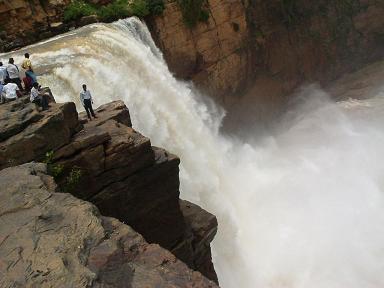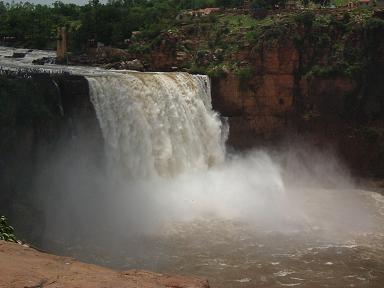
A relatively unknown but exotic summer getaway is Karnataka’s Gokak falls. Often compared to the globally famous Niagara falls this thundering waterbody is sited in the Belgaum district of Karnataka state. Sited in a picture postcard location between two tall, craggy cliffs in Gokak falls is an ideal soul-soothing destination.
One can hear the roar of the fall much before it actually comes into sight. Gokak falls is formed when the Ghataprabha river after flowing through the black soil plains enters the rocky belt of Gokak where the flow of the river is broken by a tableland about 180 ft above the neighbouring valley, forcing the river to take a giant leap over the sandstone cliff, into a horseshoe shaped gorge. The falling river makes a thundering noise.
This is one of the few falls which one can get to the top and look down into the gorge where the water is falling down into the dizzying depths. The closer one gets to the fall and the louder one hears the roar of the water falling down into the valley is deafening. The sound makes it difficult to even make simple conversation and one has to shout hoarse to be heard. A walk along the cliffs beside the jumping waters is a soothing experience and provides panoramic views of rugged cliffs and water. Being an open space there is always a cool breeze bringing with it a gentle spray of moisture from the waterfalls.
This horseshoe shaped waterfall spans a breadth of 177 meters as it sweeps over the brink of the cliff, presents an awe-inspiring sight. The best time to view and enjoy the glory of the Gokak falls is from June-October when it rains in the region. According to the Mysore State Gazetteer Gokak falls was discovered in 1885 by British explorers, who described the falls thus: ‘Except in width and colour of water, the general features of the fall, its height, shape and rapidity above are very much like those of the Niagara.’

Soon after the discovery of the falls, the British established the Gokak Water Power and Manufacturing Company – a textile mill – with an investment of Rs.20 lakh. Later in 1907-08 the company installed an electric turbine to generate hydro-electricity. The town’s colonial past is resplendent in the mill’s elegant stone buildings. The mill and the power plant are operational even today and the main activity of the former is conversion of Cotton into yarn.
Another important historical landmark here is the 210-metre long hanging wooden bridge built across the river built in 1907 to enable workers from nearby villages to cross the river and arrive at work. A walk on this century old creaking bridge – on which only 30 people are allowed at a time – is a thrilling experience. One can view the breathtaking vista of the waterfalls directly below as one walks across the bridge.
Another important landmark here is the antiquated riverside temple dedicated to Lord Mahalingeshwara. Locally known as Tarakeshwara temple (as described in an inscription dated 1153 A.D of Ratta Kartaveerya III found inside the temple), the Mahalingeshwara temple is a large and sprawling structure built in the Later Chalukyan style of architecture. The temple has a garbhagriha, (sanctum), an ardhamantapa and a spacious but open mukhamantapa (frontal courtyard). The sanctum with its tall Shikara adorned with exquisite sculptures is a sight to behold.
Getting there
Road. Gokak Falls is a mere six km from Gokak town and 71 km from Belgaum. Every 15 minutes a bus departs from Belgaum’s Khade Bazaar bus terminus to Gokak.
Rail. Ghataprabha railway station about 3 km from Gokak town is the nearest railhead. The Gokak falls is about 7 km from the railway station.
Air. Belgaum has a civilian airport at Sambra. Deccan Aviation operates regular flights from all major cities across the country.



